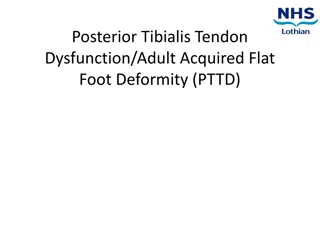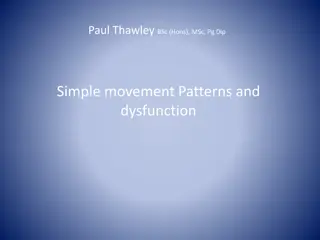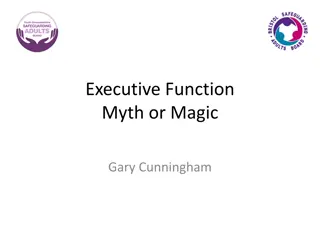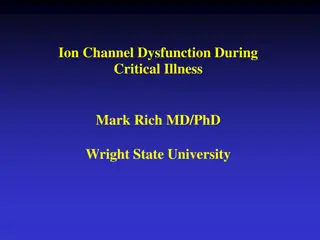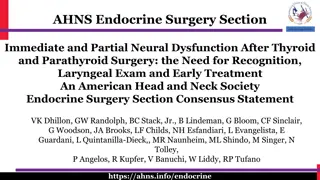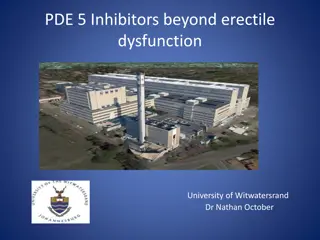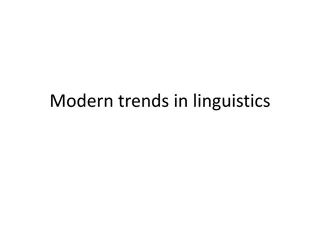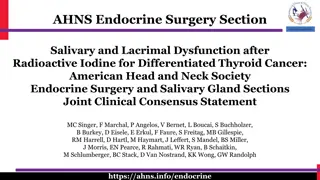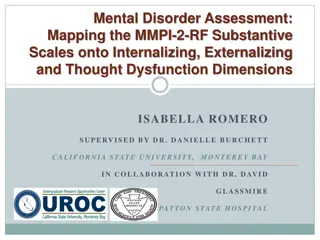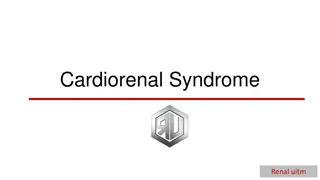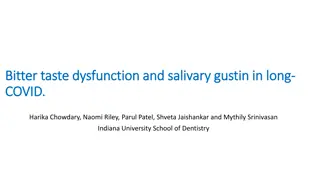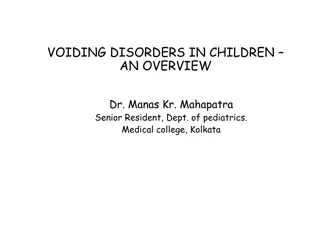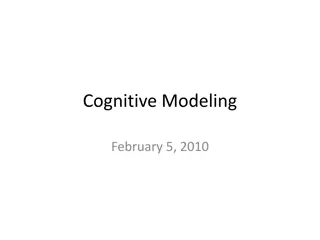Cognitive Load Classification with 2D-CNN Model in Mental Arithmetic Task
Cognitive load is crucial in assessing mental effort in tasks. This paper discusses using EEG signals and a 2D-CNN model to classify cognitive load during mental arithmetic tasks, aiming to optimize performance. EEG signals help evaluate mental workload, although they can be sensitive to noise. The
0 views • 19 slides
Brain Mineral Deposition and Cognitive Decline Study
Investigating the progression pattern of brain mineral deposition as a differential indicator of cognitive decline in individuals with varying cognitive statuses from normal to Alzheimer's disease. The study aims to develop improved imaging techniques and specific cognitive-relevant atlases to under
4 views • 24 slides
Understanding Neuropsychological Assessment: Insights and Applications
Neuropsychological assessment plays a vital role in understanding brain-behavior relationships. This process involves determining cerebral functioning, identifying dysfunction, and assessing cognitive abilities through a combination of interviews, observational data, and testing. The assessment aids
3 views • 33 slides
Understanding the Cognitive Assessment System (CAS2) Theory and Applications
The Cognitive Assessment System (CAS2), developed by Dr. Jane Yeomans, is a comprehensive tool for assessing cognitive processes in children aged 5 to 18. Unlike traditional IQ tests, CAS2 focuses on areas like Planning, Attention, Simultaneous, and Successive processing. It requires Level 2 qualifi
1 views • 29 slides
Understanding Cognitive Behavioral Therapy (CBT) by Dr. James Ikonomopoulos
Explore the foundations and application of Cognitive Behavioral Therapy (CBT) through the work of Dr. James Ikonomopoulos. Uncover the connection between thoughts, feelings, and behaviors, learn cognitive and behavioral interventions for children and adults, and delve into the cognitive model of the
0 views • 64 slides
Understanding Posterior Tibialis Tendon Dysfunction (PTTD) in Adults
Posterior Tibialis Tendon Dysfunction, also known as Adult Acquired Flat Foot Deformity (PTTD), is a condition that affects the tibialis posterior tendon, leading to reduced arch support. Common causes include obesity, trauma, age, and existing health conditions. Symptoms may include ankle pain, swe
0 views • 12 slides
Understanding Cognitive Testing in Aging: A Vital Assessment Tool
Cognitive testing plays a crucial role in assessing cognitive abilities and distinguishing normal aging from disease states in older adults. This program, a partnership between OneWorld and UNMC's Geriatrics Workforce Enhancement Program, highlights the importance of cognitive testing, its objective
0 views • 17 slides
Introduction to Cognitive Behavioral Therapy (CBT) for Beginners
Delve into the origins, principles, and applications of Cognitive Behavioral Therapy (CBT) through an exploration of its history, theory, and practical skills. Learn how CBT targets cognitive distortions and behaviors to enhance mental health and develop coping strategies. Discover the fundamental a
0 views • 23 slides
Understanding Sexual Dysfunction and Associated Factors
Sexual dysfunction encompasses a range of issues that can affect individuals, with causes including psychological, neurological, hormonal, and relationship-related factors. Evaluating sexual problems involves considering duration, context, and frequency. Psychological causes, such as anxiety and str
0 views • 25 slides
Understanding Sacroiliac Joint Dysfunction: A Comprehensive Guide
Discover the intricate anatomy of the spine, learn about the prevalence and causes of lower back pain, delve into the symptoms and diagnosis of sacroiliac joint dysfunction, and explore treatment options to manage this condition effectively.
0 views • 27 slides
Understanding Human-Computer Interaction and Cognitive Learning Theories
Human-Computer Interaction (HCI) focuses on how people interact with computers, while theories like Sweller's Cognitive Load Theory and Mayer's Cognitive Theory of Multimedia Learning explain how individuals process information. These theories emphasize optimizing learning by managing cognitive load
4 views • 8 slides
Cognitive Stimulation Therapy in Post-Acute Care: A Pilot Study
Cognitive Stimulation Therapy (CST) is an evidence-based group intervention designed for individuals with mild to moderate cognitive impairment. It aims to enhance cognitive functioning through various activities such as executive functioning tasks, multi-sensory stimulation, and reminiscence work.
0 views • 9 slides
Predictive Performance of CSF A1-42 and Tau on Cognitive Decline and Dementia Progression
Analysis conducted at the Perelman School of Medicine, University of Pennsylvania, evaluated the predictive performance of cerebrospinal fluid markers A1-42, t-tau, and p-tau181 on cognitive decline and progression to dementia. The study included 2401 ADNI1/GO/2 CSF samples from individuals across d
0 views • 19 slides
Cognitive Behavioral Therapy for Psychosis: Concepts and Applications
Explore the foundational principles of Cognitive Behavioral Therapy (CBT) for psychosis, emphasizing how thoughts influence feelings and behaviors. Gain insights into the cognitive-behavioral model of paranoia and learn about the main tenets of CBTp. Discover how CBTp can effectively address psychot
0 views • 63 slides
Early Childhood Language Learning and Bilingualism
Early childhood is a critical period for language acquisition and the development of bilingualism. Exposure to multiple languages from a young age has significant cognitive benefits. Bilingualism is a common phenomenon worldwide, with many individuals speaking more than one language. The cognitive i
0 views • 109 slides
Understanding Movement Dysfunction in Sports Medicine
Movement dysfunction in sports medicine can stem from various factors such as structural instability, loss of range of motion, functional rigidity, poor balance, and more. Clinical movement analysis plays a vital role in identifying muscle imbalances and guiding exercise interventions to enhance ath
0 views • 21 slides
Brain Health Messaging for Health Education: Promoting Cognitive Well-being
Evidence-based programs for older adults focus on managing health conditions that are risk factors for cognitive decline, such as diabetes, smoking, and heart disease. By incorporating cognitive health messages into promotions, individuals are encouraged to address these risk factors early to suppor
0 views • 5 slides
Understanding America Study: Cognitive Functioning Measures
The Understanding America Study (UAS) focuses on developing web-based cognitive functioning measures, including tests for fluid abilities, verbal skills, executive function, and processing speed. Utilizing data from about 9,000 panelists, tests like the Stop and Go Switch task are administered onlin
0 views • 26 slides
Understanding Executive Functioning and Executive Dysfunction
Executive Functioning is a key aspect of cognitive function, encompassing various abilities such as planning, self-awareness, and emotion regulation. Executive Dysfunction, often resulting from frontal lobe injuries, can lead to difficulties in decision-making, social interactions, and learning. Thi
1 views • 21 slides
Understanding Ion Channel Dysfunction in Critical Illness
An intriguing case study presents a young male with weakness and coma in the ICU following pneumonia and sepsis. Nerve conduction results indicated critical illness myopathy and polyneuropathy, along with cardiac abnormalities. Reduced muscle excitability was attributed to a sodium channelopathy. Th
0 views • 14 slides
Understanding Vocal Fold Paralysis and Neural Dysfunction After Thyroid and Parathyroid Surgery
This consensus statement by the American Head and Neck Society Endocrine Surgery Section highlights the importance of recognizing immediate vocal fold paralysis (VFP) and partial neural dysfunction (PND) following thyroid and parathyroid surgery. The report emphasizes the need for early identificati
0 views • 17 slides
Addressing Cognitive Dysfunction in Patients with Cancer: Causes, Impact, and Treatment
Understanding cognitive dysfunction in cancer patients is crucial for improving quality of life and medical outcomes. This article explores the background, causes, screening, diagnosis, and treatment options for cancer-related cognitive impairment, emphasizing the historical perspective, prevalence,
0 views • 60 slides
Master Programmes in Artificial Intelligence for Human-Centric AI Careers
Explore the world of Cognitive Systems and Cognitive Programming for Human-Centric AI at the University of Cyprus. Delve into building systems that think and behave like humans, learn from experiences, and adapt to changing circumstances. Discover the ethical considerations of Cognitive Systems and
0 views • 17 slides
Understanding Cognitive Disorders in Psychiatry: A Comprehensive Overview
Cognitive disorders disrupt higher brain functions, impacting memory, attention, and decision-making abilities. This article explores the classification of cognitive disorders, focusing on delirium, a common syndrome characterized by consciousness disturbance and cognitive changes. Delirium predomin
0 views • 26 slides
Enhancing Cognitive Flexibility for Employability
Cognitive flexibility is a crucial skill for adapting to new situations and problem-solving in today's competitive job market. This module focuses on identifying, assessing, and enhancing cognitive flexibility to nurture competitiveness and employability. Learn how to recognize the importance of cog
0 views • 24 slides
Cognitive and Behavioral Management Strategies for Traumatic Brain Injury Patients
This presentation focuses on addressing challenging cognitive, behavioral, and personality issues associated with traumatic brain injury (TBI). It outlines cognitive issues such as attention, speed of processing, learning, memory, and executive functioning. Cognitive management strategies include te
0 views • 18 slides
Understanding Psychophysical Methods in Cognitive Neuroscience
This collection of images explores the field of psychophysics, focusing on perception, reality, behavior, and the analysis of cognitive functions. The images delve into the reasons for studying psychophysical methods, the complexity of neuro-cognitive phenomena, and the importance of behavioral meas
0 views • 21 slides
Impact of Yoga on Cognitive Functioning in Aging Adults
Aging is often accompanied by a decline in cognitive functions, affecting areas such as memory, attention, and reasoning. This article explores the relationship between aging and cognitive impairment, along with various treatment options including drug therapy, dietary interventions, and cognitive e
0 views • 42 slides
Exploring the Diverse Applications of PDE-5 Inhibitors Beyond Erectile Dysfunction
Discover how PDE-5 inhibitors go beyond treating erectile dysfunction, with approved and emerging compounds, alternative dose regimens, concentration sites, and potential targets like cardiovascular diseases and the central nervous system.
0 views • 47 slides
Exploring Cognitive Linguistics: A Modern Approach to Language Analysis
Cognitive linguistics is an approach that views language as interconnected with cognitive capacities, emphasizing language's role in organizing and conveying information. It examines how linguistic structures reflect conceptual organization, categorization principles, and environmental influences, h
0 views • 21 slides
Evolution of Cognitive Counseling and Aaron T. Beck's Contribution
In the historical context following World War II, a shift occurred in psychology towards cognitive counseling with the emergence of cognitive therapy by Aaron T. Beck. Beck, a psychoanalytically trained psychiatrist, challenged traditional psychoanalytic concepts and developed cognitive therapy to t
0 views • 26 slides
Salivary and Lacrimal Dysfunction after Radioactive Iodine Treatment
Radioactive iodine (RAI) is commonly used in treating differentiated thyroid cancer but can lead to salivary and lacrimal dysfunction. This joint clinical consensus statement by the American Head and Neck Society Endocrine Surgery and Salivary Gland Sections highlights the importance of understandin
0 views • 20 slides
Understanding the MMPI-2-RF Substantive Scales for Mental Disorder Assessment
This research explores mapping the MMPI-2-RF substantive scales onto internalizing, externalizing, and thought dysfunction dimensions in mental health assessment. The study emphasizes the importance of validating assessments for accurate clinical pictures and effective treatment planning. It delves
0 views • 17 slides
Understanding Pelvic Floor Dysfunction and Prolapse in Women
Pelvic floor dysfunction and prolapse are common issues affecting women, impacting their physical and emotional well-being. Surgical treatment may be necessary for symptomatic cases, but a thorough evaluation of symptoms, obstetric history, and other factors is crucial. Addressing precipitating fact
0 views • 72 slides
The Relationship Between Cognitive Flexibility and Psychological Flexibility After Acquired Brain Injury
This study explores how cognitive flexibility and psychological flexibility interact after an acquired brain injury. It examines whether individuals who exhibit cognitive inflexibility can achieve psychological flexibility, considering the impact of cognitive impairments post-injury. Cognitive flexi
0 views • 21 slides
Understanding Cardiorenal Syndrome: A Complex Relationship Between the Heart and Kidneys
Cardiorenal Syndrome is a condition where dysfunction in one organ, whether acute or chronic, can lead to dysfunction in the other. This complex relationship involves intricate communication pathways between the heart and kidneys, impacting hemodynamic stability, organ perfusion, and neurohormonal i
0 views • 15 slides
Salivary Gustin and Taste Dysfunction in Long-COVID Patients
The research explores the association between taste perception and the duration of COVID infection in long-COVID and COVID-reinfection cases. Reduced salivary gustin levels correlated with lower taste scores in long-COVID patients. The study also found an increase in the bitter taste receptor gene e
1 views • 4 slides
Understanding Primary Ovarian Insufficiency: Definition, Pathophysiology, Clinical Features
Primary ovarian insufficiency, also known as hypergonadotropic amenorrhea, is a condition characterized by ovarian dysfunction in women under 40. It involves oligo/amenorrhea, elevated FSH levels, and impacts fertility and overall health. The pathophysiology includes follicle depletion and dysfuncti
0 views • 46 slides
Understanding Voiding Disorders in Children: An Overview by Dr. Manas Kr. Mahapatra
Voiding disorders in children, also known as bladder dysfunction, are a common issue affecting up to 40% of pediatric urology clinic visits. These disorders can indicate underlying pathophysiology requiring treatment to prevent renal or urologic damage. The development of urinary control by age 5 is
0 views • 53 slides
Understanding Cognitive Modeling in Learning Sciences
Cognitive modeling is a key aspect of simulating human problem-solving and mental processes in computerized models. It involves the use of various types of cognitive models, such as production-rule systems and constraint-based models, to predict human behavior and performance on tasks. This field en
0 views • 83 slides





